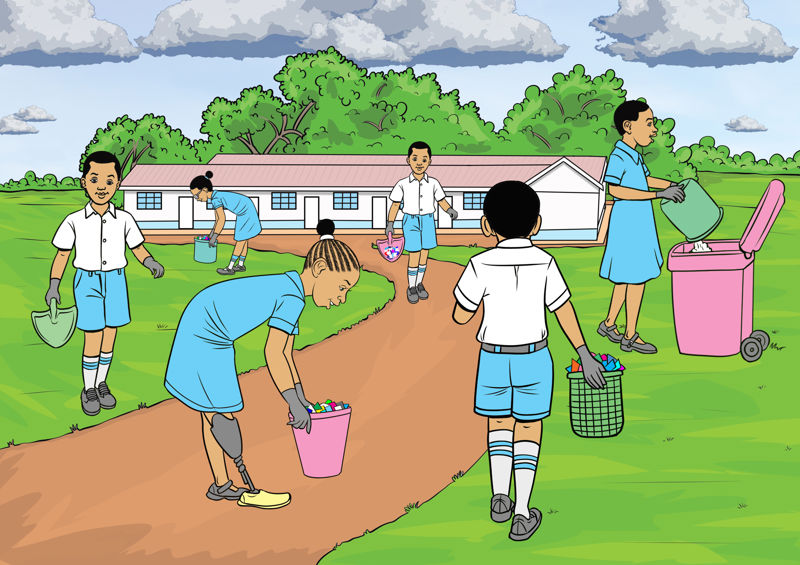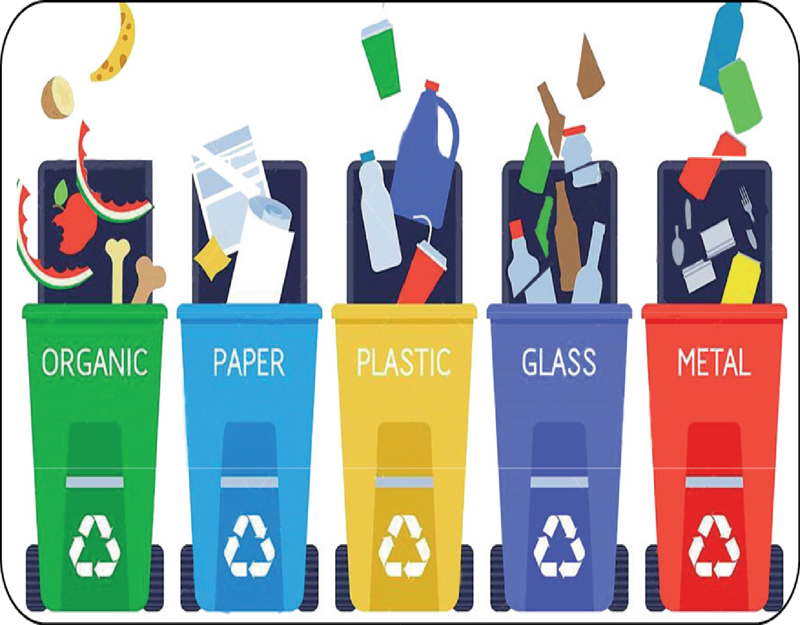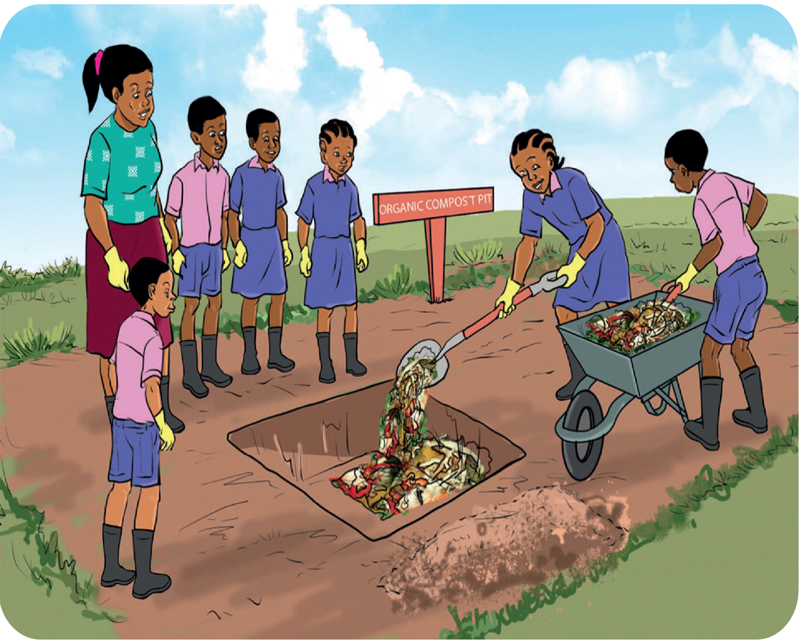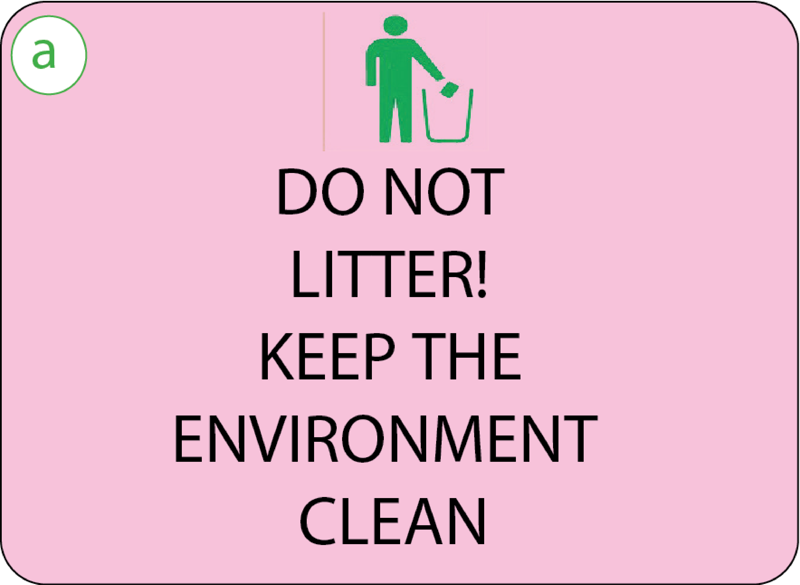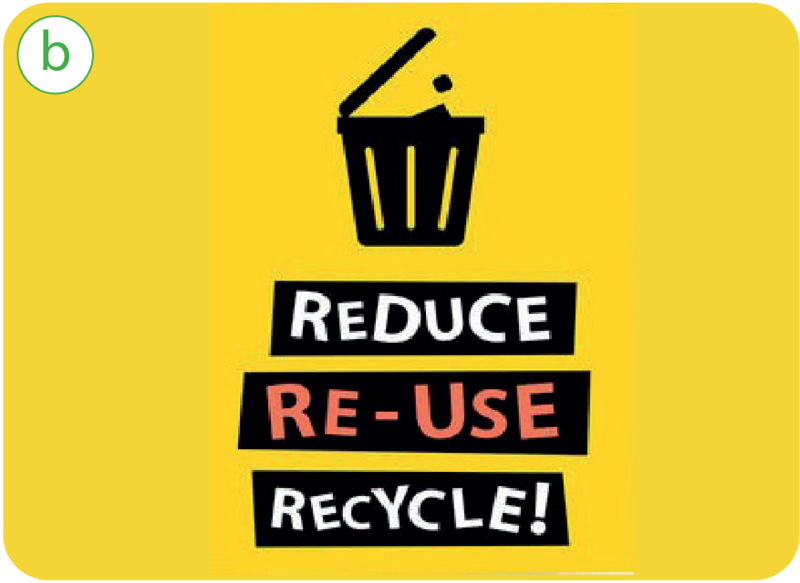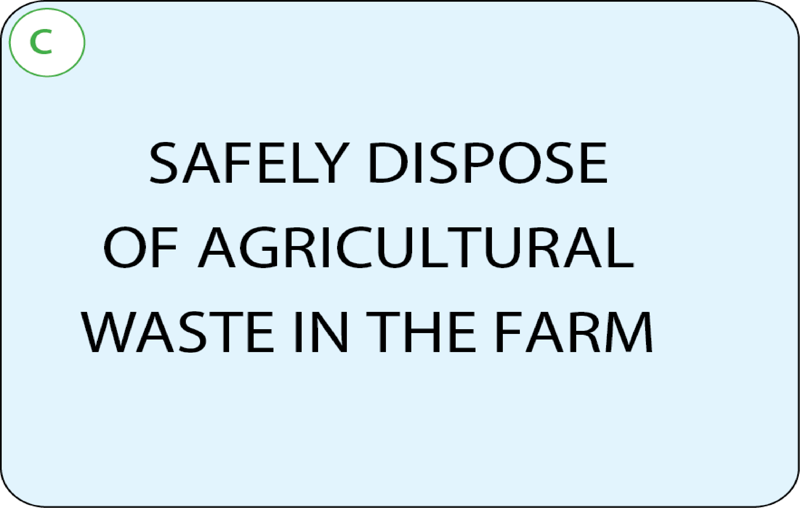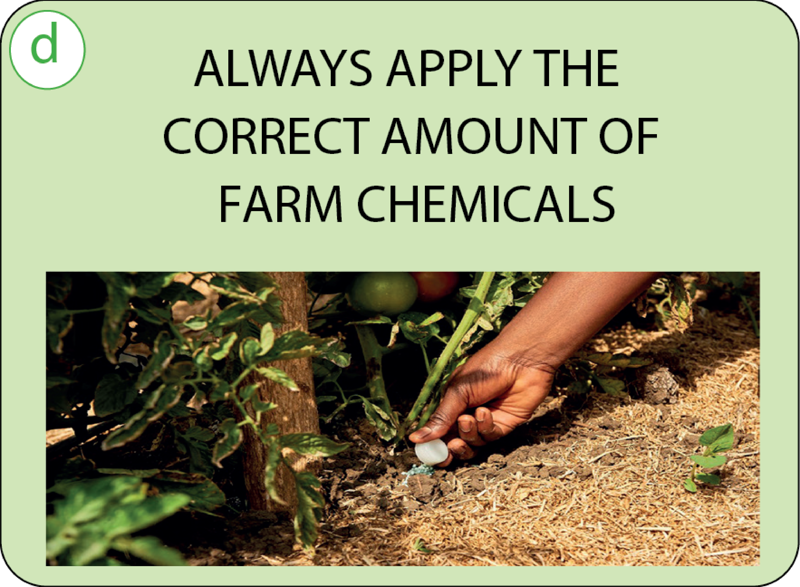In Grade 6, we learnt about soil erosion control. In Grade 7, we are going to learn about soil pollution control. We will also learn about farming practices that control soil pollution in the agricultural environment.
Causes of soil pollution in farming
Think about it
What are the agricultural human activities that contaminate soil?
Activity 1: Work in pairs
Study the picture below and answer the questions that follow.
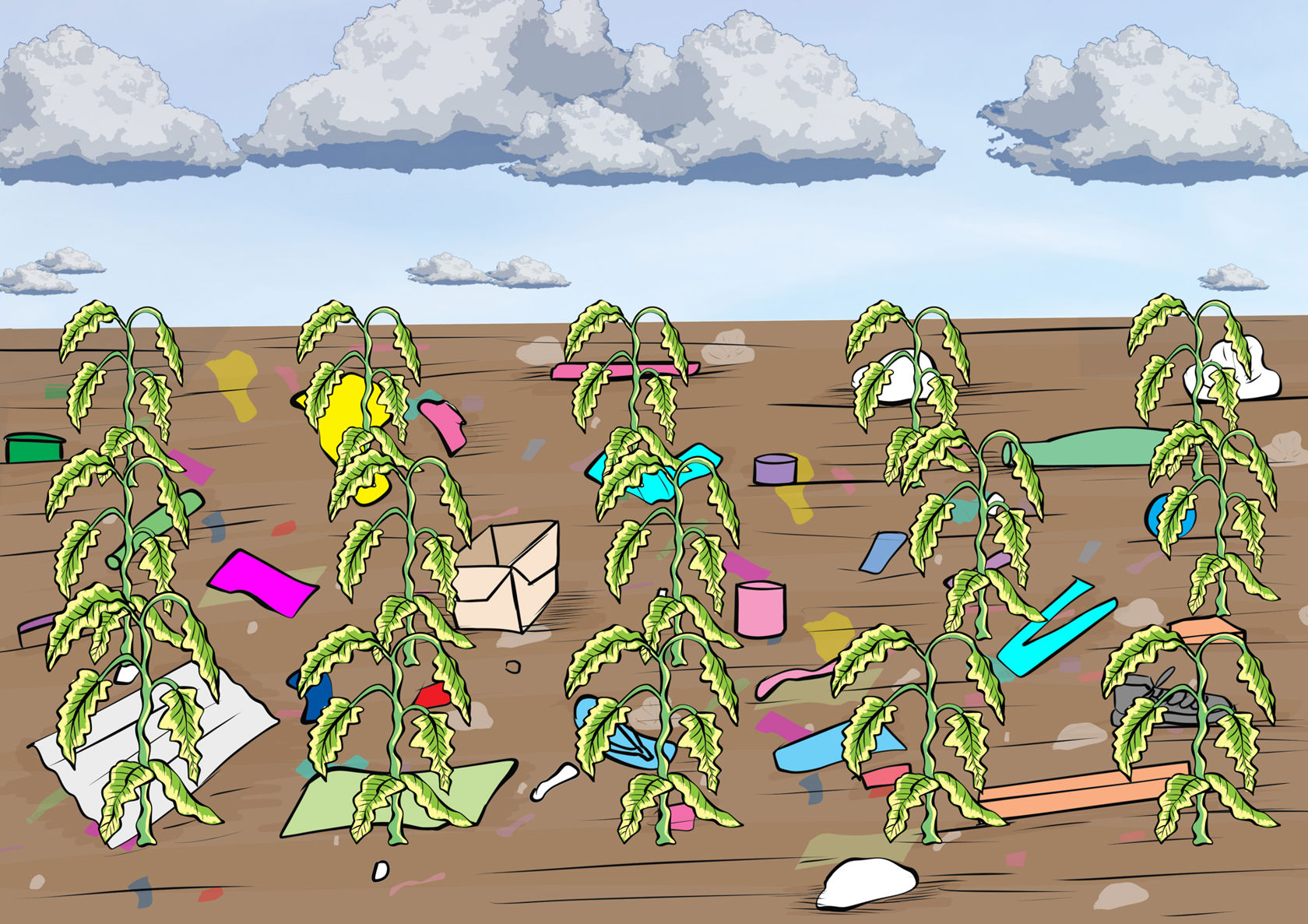
1. Identify the materials dumped on the soil in the picture above.
- trousers
- a tube of toothpaste
- a bottle
- scissors
- cardboard box
- flip-flops
2. Discuss the damage the materials can cause to the soil.
Activity 2: Work in groups
Read the conversation below between two farmers.
Baraka: | Hello Amida. What is pollution? |
Amida: | Hello Baraka. Soil pollution is the contamination of soil. |
Baraka: | What contaminates the soil? |
Amida: | Solid waste such as plastics waste and chemical containers pollute the soil. Also, excess use of farm chemicals contaminates the soil. |
Baraka: | Now I know the meaning of soil pollution and what causes soil pollution. Thank you, Amida. |
Answer the following questions.
- Sometimes, farmers apply excess farm chemicals to crops. Explain why this is a bad farming practice.
- Discuss the meaning of soil pollution and causes of soil pollution.
- Present your findings during a class discussion.
Soil pollutants
Activity 3: Work in groups
Digital corner
- Watch the video and make notes.
- Discuss various causes of soil pollution in farming.
- Share your findings during a class discussion.
Learning points
Substances that cause soil pollution are called soil pollutants. Solid wastes such as plastic waste and chemical containers are examples of soil pollutants. Excessive use of artificial fertilisers and other farm chemicals pollute the soil.
Did you know?
In Nairobi, the capital city of Kenya, it is estimated that 2,400 tonnes of solid waste is generated every day. About 20% of the waste is plastic materials. Poor waste management, coupled with rising urban pressure have heightened the risks of environmental degradation in the city inhabited by approximately 4.4 million people.
This information has been published in the World Bank website.
Controlling soil pollution in the agricultural environment
There are several agricultural practices that farmers should use to control soil pollution in the agricultural environment.
Think about it
What are the best practices for controlling soil pollution?
Activity 4: Work as a class
Collecting and safely disposing of waste in the school environment
What you need: Gloves, garbage bags, a wheelbarrow and waste bins.
What to do
- Wear the gloves correctly and collect waste in your school compound.
- Sort the litter into plastic waste, chemical containers, waste paper, organic waste and any other waste materials.
- Put the waste into the appropriate waste bins. Put plastic waste into the plastic waste bin. Put waste paper into the waste paper bin, glass waste into the glass waste bin, metallic waste into the metallic waste bin and organic waste into the organic waste bin.
- Put the organic waste in the compost pit in the school farm.
- Inform your teacher to call the recyclers to collect the waste paper, plastic, glass and metallic wastes for recycling.
Answer the following questions.
- Discuss the importance of safe disposal of waste in the environment.
- What are the benefits of reusing used plastic containers?
Activity 5: Work as a class
Farm visit
What you need: Artificial fertiliser and gloves.
What to do
- Visit your school farm and observe how farm chemicals are applied to crops.
- Ask the farm manager or your teacher to guide you on how to apply the correct amount of artificial fertilisers to the crops.
- Apply the correct amount of fertilisers to the crops as recommended.
- Collect litter in the farm and dispose it well.
- Later in class, discuss what you learnt in the farm.
Learning points
Managing waste involves collecting, sorting and safe disposal of the waste. Organic waste is dumped in compost pits and later used as organic manure. Plastic waste is taken to factories for recycling and some are reused in the farm. Farmers are advised to apply the correct amount of farm chemicals.
Did you know?
It is illegal to use, import or manufacture plastic carrier bags in Kenya!
Through the gazette notice number 2334 of 14th March 2017, the Ministry of Environment and Natural Resources banned the use, manufacture and importation of plastic bags in Kenya effective 28th August 2017. Anyone found manufacturing, importing or selling plastic carrier bags could be fined up to Ksh 4 million or face a prison sentence of up to four years. Using the banned bags carries a fine of more than Ksh 50,000 or a jail term of up to a year.
Say no to use of plastic bags!
Promoting safe farming practices to prevent soil pollution
There are certain farming practices that are safe for conserving the environment. These practices prevent soil pollution.
Think about it
We have already learnt about measures used to control soil pollution. Suggest how the message will reach the rest of the school and the surrounding community.
Activity 6: Work in groups
Creating awareness messages against soil pollution in school
What you need: Manila papers, pencil, marker pens, rulers and a masking tape.
What to do
Read the posters below.
- Using manila papers, a pencil and a marker pen, come up with similar posters as shown above. Share your posters with the rest of the class.
- Use a masking tape to stick the posters at the appropriate places in the school compound.
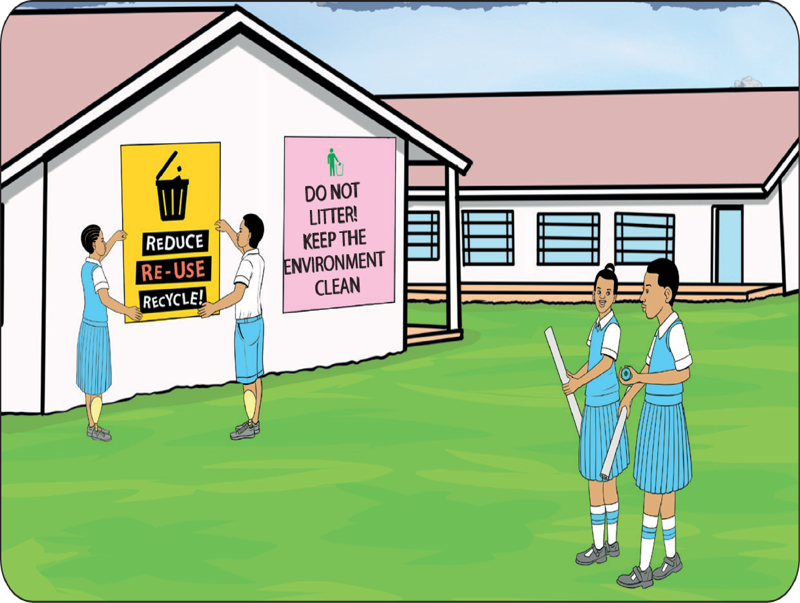
Learning points
There are various methods of promoting safe farming practices that prevent soil pollution in the agricultural environment. Posters, songs, poems, stickers, stories and other forms of communication can be used to create awareness. The messages educate the public on how to prevent soil pollution.
Further activity: Work in groups
- Compose songs on:
- Safe disposal of plastic waste.
- Safe disposal of chemical containers.
- Correct use of farm chemicals.
- Write the songs in your note books.
- Practise singing the songs in class. Later, sing the songs to the rest of the learners during assembly or games time.
- During school open day, sing the songs to the parents and visitors.
Home activity
With the help of your parent or guardian:
- Make various waste bins at home using locally available containers. Inform your family members that waste should be disposed of in the appropriate waste bins.
- Apply the correct types and amount of farm chemicals to the crops in your home farm.
Assessment 1
- Explain the meaning of soil pollution.
- Explain three causes of soil pollution in the agricultural environment.
- The picture below shows plastic waste that was dumped near a farm. Study it and answer the questions that follow.
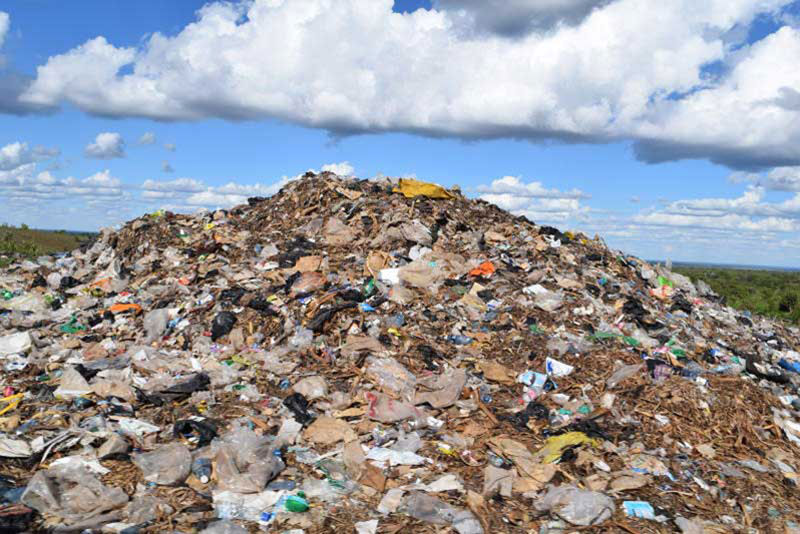
- Explain the harmful effects of what has been dumped on the land to the soil.
- What should be done to avoid such an occurrence?
- Describe how the land can be made useful again.
- Explain the disadvantage of using excess farm chemicals on the soil.
- Explain the importance of controlling soil pollution in the agricultural environment.
Task | I can do this. | I need to practise more. | I need help. |
I can explain the causes of soil pollution in farming. | |||
I can control soil pollution in an agricultural environment. | |||
I can create awareness messages against soil pollution. | |||
I can demonstrate responsibility in using safe farming practices to conserve soil. |
